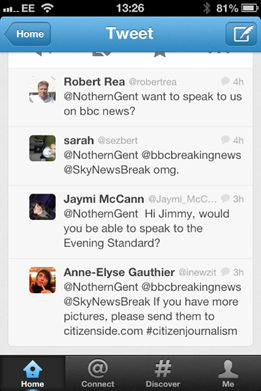“It’s a strange old world we live in”, remarked BBC Radio Five Live presenter, Rachel Burden just after 9am on Wednesday January 16th. “Something like this happens, someone takes out their camera phone and this is how the news disseminates”.
It was a throw-away yet incredibly perceptive comment by the breakfast presenter who was in the middle of co-anchoring a rolling-news special .
An hour before, the same programme had broadcast that it was ‘receiving reports’ that a helicopter had crashed close to the South Bank in Central London. The reality was that a helicopter had collided with a crane working on ‘The Tower’ at St Georges Wharf – a structure in the process of becoming one of Europe’s largest residential towers. It had then plummeted to the ground during rush hour - killing the pilot and a member of the public below. The incident itself was astounding enough. The way in which it was disseminated to the wider public through social media and in turn, the more traditional media was unprecedented in this country.
The crash happened just after 8am. By 8.17am it was the top story in BBC Radio Five Live’s news headlines. Within another twenty minutes or so, the programme had it’s first of many eye-witnesses on the line. This included the MP for Loughborough, Nicky Morgan. Now as a Journalist, an eye witness is gold dust – regardless of who they are. The chances of you tracking one down in the hours after an incident like this are slim unless you are able to deploy to the scene immediately. Within minutes is unheard of using only traditional forms of reporting.
The reason Nicky Morgan was so accessible was quite simple…..Twitter. Shortly after the crash she Tweeted; ‘Something happening near Vauxhall. Big Bang and clouds of black smoke’. For a journalist frantically searching Twitter for the words ‘Vauxhall’ at this stage – that Tweet would have been the answer to their prayers. As a Member of Parliament, they may already have had Ms Morgan’s mobile number stored In their contacts database. Within minutes of the Tweet she became one of the first to report what she had seen and heard on the BBC.
Following the MP for Loughborough were a stream of other eye witnesses and people living/working near to the scene of the crash - all gleaned through social media and journalists searching under hashtags like ‘helicopter crash’.
A process which traditionally would take hours and days had been reduced to minutes and seconds. Not only was the world learning about the helicopter crash through Twitter, the UK media was too.

Approaching people on Twitter was immediate and direct by the journalists. Moments after a man Tweeted a picture of the crash site with the words; ‘Helicopter crashes in Vauxhall outside my flat after hitting crane at St George Wharf’, there followed a stream of media requests (helped by his inclusion of the BBC’s Breaking News and Sky Breaking News Twitter handles in his Tweet).
As television crews were moved further and further away from the scene of the collision – which had erupted into flames by now spurred by the spilt helicopter fuel – television networks became reliant on pictures and video clips being posted on Twitter for their coverage.
For the emergency services involved in the incident – time was of the essence and the communications teams handling enquiries for those services were overwhelmed. Traditionally, communication would have been directly between press officer and individual journalist, through press release and eventually press conference - all of this amounting to a lengthy process for the press teams and journalists. Social media has now added another more instantaneous way to communicate the most basic of messages though. Within an hour or so of the crash, the brigade had Tweeted; ‘We’re attending reports of a helicopter crash near Wandsworth Road in South London. More when we have it’. This then progressed into a steady stream of updates including information about fire crews working to make the crane safe, to checks being carried out along the River Thames’. All of these being crucial messages that were able to come directly from the organisation in question to the rest of the world. Of course, not everyone believes that social media has improved the reporting of news events like this one. A cursory trawl through Twitter reveals that some find pictures ‘ghoulish’ and ‘uncomfortable’. Elsewhere, others feel somehow wronged that an innocent Tweet could lead to the world’s media clogging up their timeline;
Of course, not everyone believes that social media has improved the reporting of news events like this one. A cursory trawl through Twitter reveals that some find pictures ‘ghoulish’ and ‘uncomfortable’. Elsewhere, others feel somehow wronged that an innocent Tweet could lead to the world’s media clogging up their timeline;
The fact remains that social media has dramatically changed the reporting of events, almost to the extent that the traditional media has simply become another outlet for it. There are both pro’s and con’s to this incredibly fast form of information dissemination. But we all need to concede that it is here.
To learn more about Media First click here


